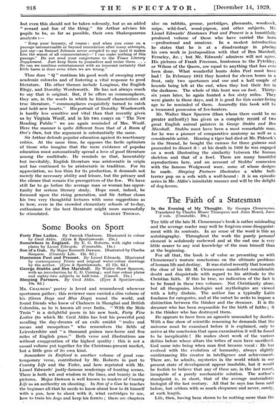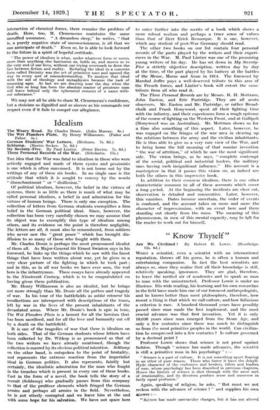The Faith of a Statesman
In the Evening of My Thought. By Georges Clemenceau. Translated by Charles Misser Thompson and John Heard, Junr. 2 vols. (Constable. 30s.) THE title of the late M. Clemenceau's book is rather misleading and the average reader may well be forgiven some disappoint- ment with its contents. In no sense of the word is this an autobiography. Throughout the work the purely "personal element is sedulously eschewed and at the end one- is very little nearer to any real knowledge of the man himself than at the beginning.
For all that, the book is of value as presenting us with Clemenceau's mature conclusions on the ultimate problems of human life and destiny. It was stated recently that towards the close of his life M. Clemenceau manifested considerable doubt and disquietude with regard to his attitude to the Christian faith. If this be true, no indication of the fact is to be found in these two volumes. Not Christianity alone, but all theogonies, ideologies and mythologies are viewed with a lofty disdain. The author has a typically Latin fondness for categories, and at the outset he seeks to impose a distinction between the thinker and the dreamer. It is the dreamer who has been responsible for the birth of faiths ; it is the thinker who has destroyed them.
He appears to have been an agnostic unassailed by doubts. With a fine show of scientific reasoning he demands that the universe must be examined before it is explained, only to arrive at the conclusion that upon examination it will be found to be inexplicable I He makes short work of the various deities before whose altars the tribes of men have sacrificed. God came into being when man first became vocal : He has evolved with the evolution of humanity, always slightly outdistancing His creator in intelligence and achievement. There are, he admits, mysteries in the world which in our present state of development appear insoluble, but it would be foolish to believe that any of these are, in the last resort, incapable of a purely mechanistic solution. The author's standpoint is, in short, that of the average materialistic biologist of the last century. All that he says has been said before, but seldom with so much eloquence and never, surely, at such -length.
Life, then, having been shown to be nothing more than the
interaction of chemical forces, there remains the problem of death. Here, too, M. Clemeneeau maintains the same unruffled assurance. " A dreamless sleep," he writes, " that is, a purely- negative state of unconsciousness, is all that we' can anticipate of death." Even so, he is able to look forward to the future in a spirit of hopeful certitude.
" The power of idealism is what, under whatever form or name. More than anything else fascinates us, holds us, and moves us to the very end of our lives, without our trying overmuch to draw the, line between fiction and reality. Reducing the ideal to a concrete - form called Divinity was the act of primitive man and opened the way to every sort of misunderstanding. To analyze that ideal' with the aid of theology and metaphysics became the task of reasoning ages. At last we are drawing near the day when the God who so long has been the absolute master of prostrate man will leave behind only the ephemeral remains of a name with- out substance."
We may not all be able to share M. Clemenceau's confidence, but a stoicism so dignified and so sincere as his commands our respect even if it fails to compel our allegiance.













































 Previous page
Previous page